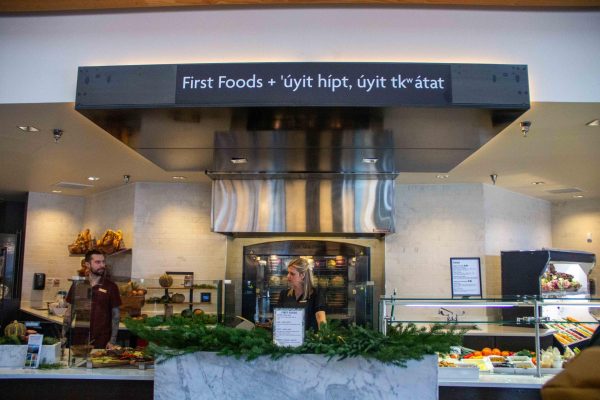
On Feb. 7, Cleveland Commons’s rotisserie station transformed from the usual day-to-day salad toppers to an impressive display of bison steaks, fry bread with huckleberry jam, and Copper River steelhead trout. Students and community members alike lined up to get a chance to taste these dishes, excited about the new “First Foods” monthly station that Cleveland Commons announced last semester. The station will return the first Friday of every month, aiming to raise awareness around Indigenous culture through its food offerings.
“Diversity in food options is important, as it brings cultural understanding and a sense of belonging to Whitman students with various backgrounds. We want all students to feel comfortable and have meals that align with their culture,” said Shannon Null, the general manager of Bon Appétit Food Service at Whitman.
Bon Appétit expanding their stations to honor Native foods has brought them closer to achieving many of their goals for the dining hall. The station helps promote sustainable food sourcing and helps provide education on the foods and culture of the Confederated Tribes of the Umatilla Indian Reservation (CTUIR).
Null acknowledged that while land acknowledgments are common practice on campus, expanding beyond acknowledgment alone and into action is critical to sharing more about traditions and shaping a more respectful and knowledgeable community.
Jeanine Gordon, special assistant to the President for Native American Outreach, explained how the station is able to provide a glimpse into Native American customs and traditions. Gordon also highlighted the work and careful planning that Bon Appétit did to share this culture through the station, something that is no easy feat for any large-scale dining service.
“Bon Appétit at Whitman decides which foods to make based on the traditional foods of the Confederated Tribes of the Umatilla Indian Reservation, which are referred to as ‘First Foods.’ Those foods are: water, fish, meat, roots and berries. The traditional foods that we have interacted with, taken care of, consumed, fished, hunted and gathered since time immemorial throughout our usual and accustomed areas within the lands and territories that were ceded to the U.S. government for colonial settlement during the Treaty Era,” Gordon said.
As part of this process, staff not only learned what to cook, but how to cook it. Null elaborated, acknowledging that although certain traditions have shifted over the years, many have remained and that maintaining those was key to preparing the food. To do so, Bon Appétit partnered with the First Foods Policy Program at the Nixyáawii Longhouse of the CTUIR, which works to protect and restore First Foods. As part of this educational process, the policy program centers on environmental consciousness, teaching how to manage and protect these first food resources nearby and how to prepare them in a way that does not produce excess waste.
A critical part of the station’s early success comes from the people who enjoy the food after its preparation. Cleveland Commons brings in people both from the campus and off it to enjoy its food. Gordon explained that this sense of community is critical to the station.
“[We want to] provide a stronger presence of Native American culture on campus that provides experience and education to our campus community and the larger community of the Walla Walla Valley,” Gordon said.
Students and community members alike lined up in anticipation of the station’s opening. Community member Sherri Maret was one of the first in line, and she explained her personal experience drew her to the station in Cleveland.
“I’m actually Choctaw. . . and since Choctaws are in Oklahoma, I’m really interested in learning more about the other nations and respecting their cultures,” Maret said.
The First Foods station provides an invitation for community members to engage with Native culture and fosters a connection between campus and the larger Walla Walla community. The station will return next on March 7, and will continue offering delicious tasting food alongside critical education.
